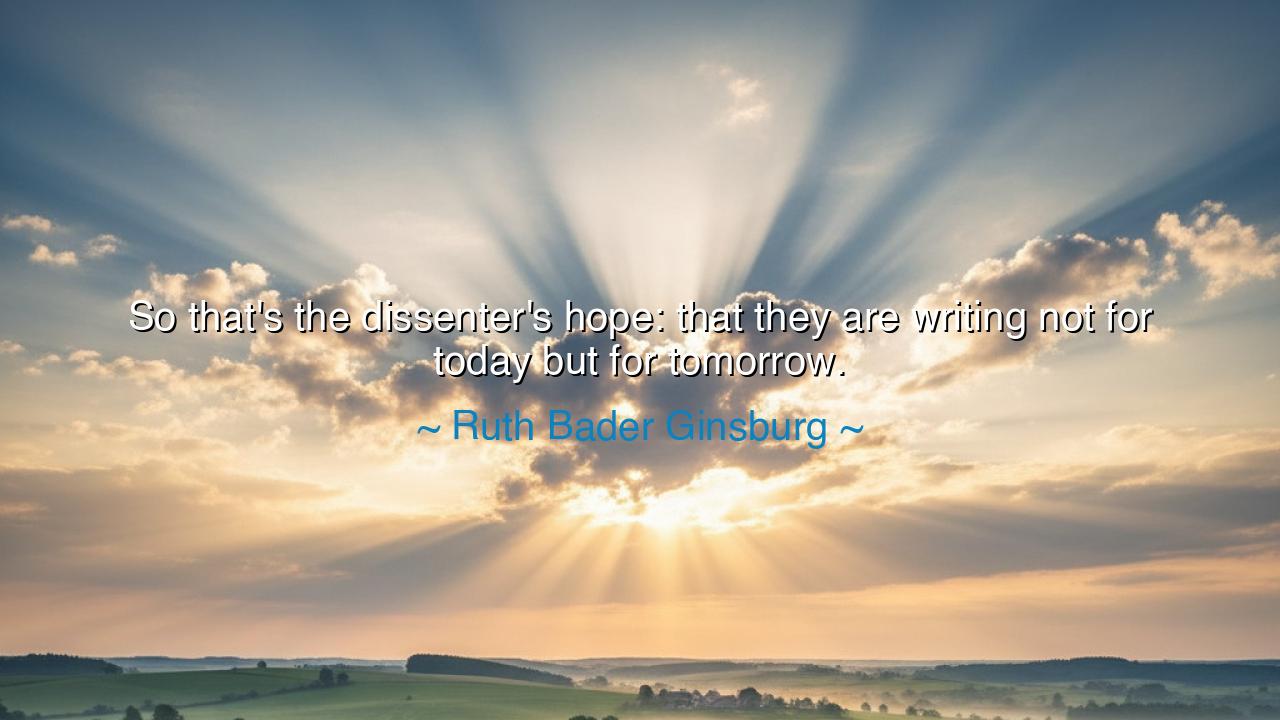
So that's the dissenter's hope: that they are writing not for






"So that's the dissenter's hope: that they are writing not for today but for tomorrow." – Ruth Bader Ginsburg
In these luminous words, Ruth Bader Ginsburg, the great guardian of justice and equality, speaks to the eternal struggle of the soul that stands alone against the tide. A dissenter, she reminds us, is not one who seeks discord for its own sake, but one who plants seeds of truth that may only bloom in the soil of the future. To dissent is to believe that today’s rejection can become tomorrow’s wisdom, that the voice ignored in its time may one day become the chorus of a more enlightened age. Thus, Ginsburg’s words shine like a beacon for all who labor for justice in the face of indifference — a call to endure, to hope, and to write for a dawn yet unseen.
The origin of this quote lies in Ginsburg’s own life upon the highest court of her land. As a Justice of the United States Supreme Court, she often found herself in the minority, penning dissents against decisions that, in her eyes, failed the cause of equality and human dignity. Yet she did not despair. She knew that a dissent is not defeat — it is a declaration of faith that reason and righteousness will, in time, prevail. When she wrote, she wrote not only for her peers but for generations unborn. And indeed, many of her dissents — once lonely — later became the foundation of law. Her words were not merely judgments; they were prophecies.
Consider, for example, the story of John Marshall Harlan, who in 1896 stood alone in dissent when the Supreme Court upheld racial segregation in Plessy v. Ferguson. His solitary voice cried out that the Constitution was “color-blind,” and that “there is no caste here.” His words fell upon deaf ears in his day — but more than half a century later, they rose again in Brown v. Board of Education, when the Court finally struck down segregation. Harlan’s dissent became the seed of justice, his hope fulfilled by those who followed him. This is the legacy that Ginsburg invoked — the sacred continuity of courage across time.
To be a dissenter is to walk a lonely path. The world often mocks or dismisses those who stand apart. Yet it is through such voices that humanity evolves. The prophets, the reformers, the thinkers who dared to challenge custom — all were once regarded as heretics or fools. But the truth of tomorrow often begins as the heresy of today. Thus, the dissenter’s pen is mightier than the sword of the conqueror, for the sword rules only the moment, while the written word endures through the ages, whispering to hearts not yet born.
There is, too, great humility in the dissenter’s hope. They know they may not live to see their victory. Their joy is not in triumph, but in fidelity — in knowing they have spoken truth as they saw it, regardless of who listened. Like Socrates, who drank the cup of poison rather than betray his conscience, or Galileo, who whispered that the Earth still moved even as the Church condemned him — the dissenter stands not for reward, but for truth itself. They live by a faith that justice moves slowly but surely, that the arc of history bends toward light, though its path is long and unseen.
So, my children, heed this lesson: when you speak for what is right and find yourself alone, do not despair. Remember the words of Ginsburg — you are writing for tomorrow. Every act of integrity, every word spoken in defense of fairness, joins the great chain of human progress. You may not see its fruits, but they will come, for truth, once uttered, never dies. It waits, it whispers, it awakens — and when the time is ripe, it blossoms.
Lesson: Be brave enough to dissent when conscience demands it. Speak, write, act — not for applause, but for posterity. Know that the seeds you plant in the soil of resistance will one day grow into forests of freedom. For the dissenter’s hope is the world’s inheritance: that the voices of today’s few become the wisdom of tomorrow’s many, and that through courage and patience, justice — eternal and radiant — shall prevail.






AAdministratorAdministrator
Welcome, honored guests. Please leave a comment, we will respond soon